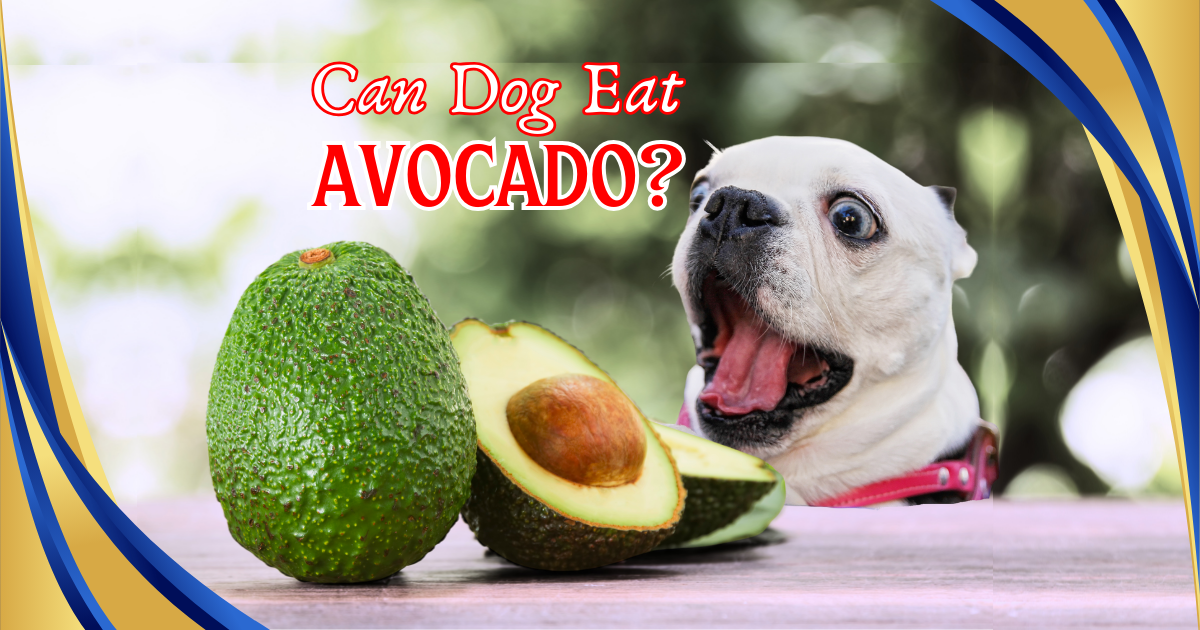Avocados are celebrated as a superfood for humans, but what about our furry friends? Many dog owners wonder, “Can dogs eat avocado?” While avocados offer a wealth of nutritional benefits for humans, the answer for dogs isn’t so simple. Certain parts of the avocado can be dangerous, and in some cases, consuming avocado can lead to serious health issues for your dog. In this post, we’ll explore 5 critical reasons why dogs should be cautious around avocados, what parts are safe, and what to do if your dog eats avocado.
Can Dogs Eat Avocado? Understanding the Risks
The question “Can dogs eat avocado?” is a bit tricky because while some parts of the avocado may be safe in moderation, others are highly toxic to dogs. The flesh of the avocado itself contains many nutrients, but it also poses potential risks. The primary concern lies in a substance called persin, a toxin found in the avocado plant that can be dangerous to dogs in large amounts.
What Is Persin?
Persin is a natural fungicidal toxin found in the skin, pit, and leaves of the avocado plant. While persin is generally harmless to humans, it can cause illness in dogs, especially in higher concentrations. The amount of persin in the avocado flesh is lower than in the pit or skin, but it’s still something to be cautious about.
So, can dogs eat avocado flesh safely? While the flesh is less dangerous than other parts, some dogs may experience stomach upset after eating even small amounts. However, the real danger comes from the pit, which poses both a choking hazard and contains higher levels of persin.
Which Part of the Avocado Is Harmful to Dogs?
Not all parts of the avocado are equally dangerous. Let’s break down the various components of the avocado and assess their risks for dogs.
1. Avocado Pit
The pit of the avocado is perhaps the most dangerous part for dogs. It’s not only a choking hazard, but it also contains a concentrated amount of persin. If ingested, the pit can block your dog’s intestines, leading to serious medical complications that may require surgery. Additionally, the hard pit can damage a dog’s teeth if they try to chew on it.
2. Avocado Skin
The skin of the avocado also contains persin in higher concentrations than the flesh. While it may not be as dangerous as the pit, the skin can cause gastrointestinal distress if consumed. Dogs that ingest avocado skin may experience symptoms like vomiting and diarrhea.
3. Avocado Leaves and Stem
The leaves and stem of the avocado plant are highly toxic to dogs due to their high persin content. If you grow avocados in your garden or have avocado plants indoors, make sure your dog doesn’t have access to the leaves or stems, as ingestion can lead to serious poisoning.
4. Avocado Flesh
When people ask, “Can dogs eat avocado?”, they are often referring to the flesh. While the flesh of the avocado is not as harmful as the pit, skin, or leaves, it can still cause issues if consumed in large amounts. Some dogs may tolerate small quantities of avocado flesh without any problems, but others may develop stomach upset due to the fat content. It’s always best to be cautious and consult your vet before offering avocado flesh to your dog.
Symptoms of Avocado Poisoning in Dogs: What to Watch For
If your dog consumes avocado, it’s important to recognize the symptoms of avocado poisoning so you can act quickly. The severity of the symptoms depends on how much of the avocado was consumed and which part of the avocado the dog ate.
Common Symptoms of Avocado Poisoning
- Vomiting: One of the first signs of avocado poisoning is vomiting, as your dog’s body tries to expel the toxins.
- Diarrhea: Diarrhea often accompanies vomiting and is another way the body attempts to remove toxins from the system.
- Lethargy: If your dog becomes unusually tired or weak, it may be a sign that they’ve consumed too much avocado or are reacting to the persin.
- Abdominal pain: Dogs with avocado poisoning may exhibit signs of stomach pain, such as whining, restlessness, or reluctance to move.
- Difficulty breathing: In severe cases, persin can cause respiratory distress, leading to difficulty breathing or even fluid accumulation around the heart (myocardial necrosis).
When to Seek Veterinary Care
If you notice any of these symptoms or suspect that your dog has ingested a large amount of avocado, contact your vet immediately. Avocado poisoning can be serious, and early intervention is key to preventing severe complications.
Can Dogs Eat Avocado Flesh Safely?
While avocado flesh is less toxic than other parts of the avocado, it should still be given to dogs with caution. In small amounts, the flesh is unlikely to cause significant harm, but it’s not without risks.
Nutritional Benefits of Avocado Flesh
Avocado flesh is rich in healthy fats, fiber, and vitamins such as vitamin E, vitamin B6, and potassium. These nutrients are beneficial for dogs in moderation, promoting healthy skin, a shiny coat, and strong muscles.
Risks of Avocado Flesh
However, avocado flesh is high in fat, which can lead to pancreatitis in dogs if consumed in large quantities. Pancreatitis is a condition in which the pancreas becomes inflamed and can cause symptoms like vomiting, lethargy, and abdominal pain. Additionally, dogs with sensitive stomachs may experience gastrointestinal upset even with small amounts of avocado flesh.
If you do choose to give your dog avocado flesh, it’s essential to:
- Remove the skin and pit: Only offer small, well-prepared pieces of avocado flesh, free from skin and pit.
- Limit portion size: Avocados should only be given as an occasional treat, and the portion size should be small to avoid digestive issues.
What to Do If Your Dog Eats Avocado: Emergency Steps
If you suspect your dog has eaten a significant amount of avocado, especially the pit, skin, or leaves, it’s important to act quickly. Here are the emergency steps you should take to ensure your dog gets the help it needs.
1. Assess What Was Eaten
Try to determine how much avocado your dog ate and which part of the avocado it consumed. If the pit or skin is missing, or if your dog had access to an avocado plant, this is more serious than just ingesting a small piece of flesh.
2. Contact Your Veterinarian
Call your vet immediately and provide them with details about the amount of avocado eaten and any symptoms your dog is showing. The vet will advise you on the next steps, which may include monitoring your dog at home or bringing it in for an examination.
3. Don’t Induce Vomiting Without Guidance
Never attempt to induce vomiting without first consulting your vet. In some cases, inducing vomiting can do more harm than good, especially if the dog is already showing signs of distress.
4. Monitor Symptoms
Keep a close eye on your dog’s behavior and look for any of the symptoms mentioned earlier, such as vomiting, diarrhea, or lethargy. If symptoms worsen, seek veterinary care immediately.
5. Veterinary Treatment
If your dog has eaten the pit or a large amount of avocado, your vet may need to perform an X-ray to determine if the pit is causing a blockage. IV fluids, medications, or even surgery may be necessary to remove the pit and prevent further complications.
Avocado Alternatives: Safe Fruits and Vegetables for Dogs
If you want to offer your dog a healthy, nutrient-rich snack without the risks associated with avocado, there are plenty of dog-safe alternatives that can provide similar benefits. Here are some safe fruits and vegetables that are great for dogs:
1. Blueberries
Rich in antioxidants and low in calories, blueberries make a fantastic treat for dogs. They’re packed with vitamins and are safe to eat in moderation.
2. Carrots
Carrots are not only crunchy and tasty, but they’re also great for your dog’s teeth. High in fiber and beta-carotene, they’re a healthy snack that most dogs love.
3. Apples
Apples are another safe and nutritious option for dogs, as long as you remove the seeds and core. Apples provide fiber, vitamin C, and antioxidants.
4. Green Beans
Green beans are low in calories and high in fiber, making them a great snack for dogs that need to watch their weight. They can be served raw or cooked without seasoning.
5. Sweet Potatoes
Sweet potatoes are a rich source of dietary fiber and vitamins. They’re also easy to digest, making them a great treat for dogs with sensitive stomachs.
Looking for a safer, nutrient-packed alternative to avocado? Check out our guide on Are Carrots Good for Dogs? Top 6 Reasons Why Your Pup Needs This Superfood! and discover why carrots are a must-have in your dog’s diet!
Conclusion: Can Dogs Eat Avocado? Proceed with Caution
While avocado flesh may offer some health benefits, the potential risks associated with other parts of the fruit, such as the pit, skin, and leaves, mean that it’s best to approach the question, “can dogs eat avocado?” with caution when it comes to your dog’s diet.Small amounts of avocado flesh may be safe for some dogs, but it’s essential to consult your veterinarian before introducing avocado into your dog’s diet. If your dog accidentally consumes avocado, acting quickly and seeking veterinary care can prevent more serious complications. When in doubt, opt for dog-safe fruits and vegetables to keep your pet happy and healthy without the risks associated with avocados.
FAQs About Dogs and Avocado
- Can dogs eat avocado?
Dogs should not eat avocado due to the potential toxicity of persin, especially in the pit, skin, and leaves. - Is avocado flesh safe for dogs?
In small amounts, avocado flesh may be safe for some dogs, but it should be given cautiously and in moderation. - What are the symptoms of avocado poisoning in dogs?
Symptoms include vomiting, diarrhea, lethargy, abdominal pain, and in severe cases, difficulty breathing. - What part of the avocado is most dangerous for dogs?
The pit and skin of the avocado are the most dangerous, as they contain high concentrations of persin. - What should I do if my dog eats avocado?
Contact your veterinarian immediately and monitor your dog for any symptoms of avocado poisoning. - Can avocado kill dogs?
While rare, severe cases of avocado poisoning can be life-threatening if left untreated. - Is avocado oil safe for dogs?
Avocado oil is generally safe in small amounts as it contains less persin, but it’s always best to consult your vet. - What are the health benefits of avocado for dogs?
Avocado flesh contains healthy fats, vitamins, and fiber, which can benefit dogs in moderation. - Can dogs eat guacamole?
No, guacamole contains additional ingredients like onions, garlic, and spices that are toxic to dogs. - What are safe alternatives to avocado for dogs?
Safe alternatives include blueberries, carrots, apples, green beans, and sweet potatoes.
Emma Rose is a professional writer with over 3 years of experience covering a wide range of topics, including health, lifestyle, and technology. She is known for her in-depth research and commitment to providing accurate, trustworthy, and engaging content. Emma’s work focuses on delivering value to readers by simplifying complex topics and ensuring every article meets high editorial standards.




